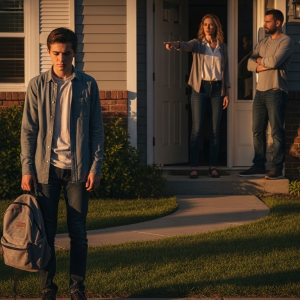When I was fifteen, my dad passed away, and my world tilted off its axis. He was the kind of man who planned for everything—meticulous, organized, a man who kept ten-year-old receipts just in case. It turns out, his own departure was no exception. His will, drafted years in advance, was a fortress of legal precision, designed to protect the one thing he cared about most. Me.
My mother, however, didn’t waste much time with grief. I understand loneliness, but the speed at which she moved on felt like a betrayal. One moment, we were standing graveside, the next she was buzzing about a new guy she’d met. It was jarring. Before I could even process the silence my father’s absence left in our home, a stranger named Rob was moving into it.
It all happened in a blur. Suddenly, this man was in my father’s chair, his things appearing on shelves where my dad’s books used to be. My mom would say, “We need to make room for Rob’s things, sweetie,” with a bright, false cheerfulness. It felt like she was methodically erasing my dad, one photograph and one favorite coffee mug at a time. That stung more than anything.
A couple of months after the funeral, I was summoned to my dad’s lawyer’s office. I remember the weight of the leather chair, the solemn look on the lawyer’s face as he explained the inheritance. My dad had left everything to me—the house, the properties, every last penny. His reasoning was cold and clear in the legal text: as they were never married, my mother had no claim.
I was stunned. At fifteen, the concept of owning anything, let alone a portfolio of properties, was overwhelming. My mother, who had accompanied me, was furious. She masked it with a tight smile and a hollow, “Oh, honey, I’m so happy for you. Your dad really loved you.” But I saw the flash of fury in her eyes. She had expected a share, and she got nothing. The will was ironclad; my dad had made sure of it.
Her supportive facade crumbled quickly. She began with subtle pushes, suggesting it would be a “nice gesture” if I shared some of my inheritance. The pressure mounted daily, disguised as motherly advice. Then came the big ask. “I was thinking,” she began one evening, “What if you transferred one of the properties to me? It would make Rob feel more secure, more a part of the family.”
I just stared at her, speechless. She wanted to give a piece of my dad’s legacy to her new boyfriend as a welcome gift. It felt like she was asking me to choose him over my father’s memory, over my own future. She was so wrapped up in building her new life that she couldn’t see how she was demolishing mine.
“I can’t,” I told her, my voice quiet. “The will is set up so I can’t touch anything until I’m twenty-one.” The look on her face was unforgettable—a flicker of pure, undiluted rage, quickly hidden behind a mask of disappointment. She knew she was beaten, but it didn’t stop her from prodding every so often. “Are you sure there’s no way?” she’d ask, testing the waters, hoping a loophole might magically appear.
Even if I could have, I wouldn’t have. It felt like a betrayal. This was my dad’s final act of taking care of me, and I wasn’t going to trade it for her boyfriend’s comfort. Meanwhile, she bent over backwards for Rob’s kids, a son and daughter slightly older than me. She curated a perfect family life for them, one from which I was quietly and consistently excluded. Family trips were planned, and for me, there was always a convenient alternative. “Wouldn’t you rather visit your grandparents?” she’d suggest, framing my exclusion as my own choice. I saw right through it, but I went along, not knowing what else to do.
I spent most weekends with my grandparents, and while they were my saving grace, each story I heard of the “family” vacation I’d missed was another small cut. Looking back, my dad must have seen this coming. Why else would he create such a rigid will? He was protecting me, not just from financial hardship, but from her. And in doing so, he’d placed me in a silent war, a fifteen-year-old boy tasked with defending his future from his own mother.
By the time I turned seventeen, the atmosphere in the house had soured completely. The awkward tension between me and Rob had escalated into open hostility. He had stopped being my mom’s boyfriend and started acting like he was the man of the house—my father’s house. That was a line I refused to let him cross.
He’d try to impose rules, his voice laced with unearned authority. “You need to show more respect around here,” he’d say, or, “It’s time you learned some discipline.” I’d just look at him, thinking, who does this guy think he is? He wasn’t my dad. He didn’t get to dictate my life in the home my father provided.
So, I pushed back. I started calling him ‘John Conroy,’ a nonsensical nickname that drove him insane. Every time he’d try to give me an order, I’d reply with a dismissive, “Alright, John Conroy, whatever you say.” The vein in his forehead would throb, and for a moment, I’d feel a small, satisfying victory. It was a petty, silent war, and I was holding my ground.
My mom, predictably, played the role of the beleaguered peacemaker. “He’s only trying to help you grow up,” she’d insist, completely missing the point. It wasn’t about help; it was about control. Rob wanted to be the alpha, and I refused to submit. Slowly but surely, my mom started taking his side in every conflict. My defiance towards him became ‘disrespect.’
The final explosion was inevitable. Rob started lecturing me about pulling my weight around the house. I snapped. “You are not my dad, and this is not your house,” I told him, my voice colder than I intended. He turned beet red, and my mom rushed in, her face etched with frustration. “Why do you always have to fight with him? Why can’t you just respect him?” she pleaded. “Why should I?” I shot back. “He doesn’t respect me, and he sure as hell doesn’t respect Dad’s memory.”
That was the last straw. Rob stormed out, and my mom looked at me, her eyes filled with a weary resignation. “This isn’t working,” she said softly. “We can’t keep living like this.” Then she dropped the bomb. “I think it’s best if you find somewhere else to stay for a while.”
I couldn’t breathe. I just stared at her, waiting for her to say she didn’t mean it. She didn’t. She looked me dead in the eye. “You’re kicking me out?” I whispered, the words catching in my throat. “Out of my own house?” She sighed. “It’s not just your house; it’s our home. Rob and his kids deserve to feel comfortable here, too.”
She was choosing them. It was that simple. She framed it as being for my own good, a chance to “cool down,” but we both knew the truth. I was the obstacle to her perfect new family. I was the ghost of her old life, and she was finally exorcising me. I slammed my bedroom door, my hands shaking with a mixture of rage and profound hurt.
My grandparents, my constant saviors, took me in without a second’s hesitation. My grandpa picked me up that night, and I sat in his car, numb, watching the house—my house—disappear in the rearview mirror. My mom had kicked me out of the home my father had left me, and I knew, even then, that nothing would ever be the same.
Living with my grandparents was like breathing fresh air after being trapped in a smoke-filled room. They were my safe harbor, never making me feel like a burden. “You’re always welcome here, kiddo,” my grandpa would say, clapping me on the shoulder. “Don’t you ever forget that.” His simple words were a balm on a wound that felt impossibly deep.
My mom would visit occasionally, putting on a performance of concerned motherhood. “I love you, you know that, right?” she’d say, her voice soft and persuasive. “I’m just trying to keep the peace.” It was a transparent attempt to soothe her own conscience. She was justifying her choice, painting herself as a martyr caught in the middle.
One afternoon, she brought over a box of my old things. “I thought you’d want these,” she said, as if it were a normal, thoughtful gesture and not a delivery of my exiled possessions. She talked about how Rob needed to feel at home, how I’d understand one day when I was older. I just nodded, the anger a cold, hard knot in my stomach. She was rewriting history, and I was the villain of her story.
After a while, I stopped engaging. I was polite but distant. I poured my energy into school, my friends, and the two people who had become my true family. My grandma’s quiet strength was my anchor. “You’ve got us,” she’d tell me, “and you are going to be okay.” I held onto that promise like a lifeline.
I began to understand that my mother was never going to be the parent I needed. She was wholly committed to her new life, and I was a relic of the past she was desperate to leave behind. So, I started to move on, too. If she could choose Rob, I could choose myself.
When I finished college, I knew it was time. Throughout my years away, the properties my dad left me were a constant reminder of his faith in my future. One of those properties was the house—the very house my mom and Rob were still living in. With a degree in hand and plans for a master’s, I decided it was time to reclaim what was mine. My plan was simple: renovate the house and rent it out to fund my continued education.
I knew the conversation with my mom would be a battlefield, but it was one I was prepared to enter. I drove to the house one afternoon, my speech rehearsed, ready to be calm and respectful. But when I knocked on the door, the house was silent. Their car was gone. They weren’t home.
Later that night, my grandma casually mentioned it. “Oh, your mom and Rob went down to Florida for a few days.” I was floored. Here I was, trying to have a mature, life-altering conversation, and they were on vacation, not even bothering to give me a heads-up. After days of unanswered calls and texts, I realized she was intentionally avoiding me.
So, I decided to stop asking for permission. Legally, the house was mine. The deed was in my name; I paid the taxes. I had every right to it. I made a call. It was time to change the locks.
The decision to change the locks felt both drastic and necessary. It was the only way to send a clear, undeniable message: this was no longer their home to treat as a permanent vacation spot. I was taking back control. While the locksmith worked, I walked through the rooms where I grew up. It was strange. The space was familiar, but it felt like a stranger’s house, filled with Rob’s furniture and his kids’ belongings. The last remnants of my father were long gone.
The next day, my phone exploded. My mom, back from her trip and locked out of the house, was incandescent with rage. Her voicemails were a torrent of disbelief and fury. “How could you do this to us? This is so disrespectful!” she screamed into the phone. I finally answered, and her voice was a shriek. “Why did you lock us out?”
I tried to remain calm, explaining that I had attempted to contact her for days. She wasn’t interested in my reasons. “You can’t just kick us out like this! We have nowhere to go!” she yelled. I explained my plan to renovate, reminding her that this was legally my property. I had every right to reclaim it.
“This is still my home!” she insisted. “You can’t just take it away from me!” In her mind, her feelings trumped legal reality. She believed she was entitled to it. At that point, I knew reasoning with her was futile. I put my foot down. “You have two weeks to find somewhere else to live and move your things.” I wanted to be firm, but fair.
The silence on the other end of the line was heavy. When she finally spoke, her voice was low and laced with venom. “I never thought my own son could be so cold. You’re just like your father.” It was meant to be an insult, but a part of me took it as a compliment. My dad had been decisive and strong—qualities I needed now more than ever.
The next morning, they were waiting for me in the driveway, a united front of fury. Rob stepped towards me, puffing out his chest in a sad attempt at intimidation. “You think you can just kick us out? You’ve got no right.” I didn’t flinch. “Actually, I do. This isn’t your house, Rob. It never was. I’m the one paying for it, and I’m the one calling the shots.” He fumed, speechless because he knew I was right.
My mom started to cry then, the performative tears I knew so well. She accused me of putting them on the street, of being heartless. It hurt, but I held my ground. I repeated the terms: two weeks. This was my property, and I was doing what was best for my future. As they finally retreated, a knot of guilt and relief formed in my chest. I had won the first battle, but I knew the war was far from over.
I thought giving them a two-week deadline would prompt them to act. Instead, it triggered an all-out campaign of emotional warfare. The next day, I went to the house to take measurements in the backyard, and my mom stormed out to confront me, her face red and tear-streaked. “How could you betray your own family?” she shouted, her voice echoing in the quiet suburban street.
“Mom, I gave you two weeks,” I said, trying to keep my voice even. “That’s more than fair.” But she was past listening to reason. She launched into a tirade about all the sacrifices she’d made for me, a narrative so twisted it was almost comical. She was painting herself as the victim, and me as the ungrateful, monstrous son.
Rob emerged, flanking her like a loyal soldier. “We’ve built a life here,” he snarled, trying to sound menacing. “And I’m taking back what’s mine,” I countered, my resolve hardening with every false accusation they threw at me. It was then that his nineteen-year-old daughter stepped onto the porch, clutching her stomach and crying.
My mom saw her cue. “She’s pregnant!” she announced, her voice filled with theatrical despair. “You can’t do this to her! You can’t kick out your pregnant stepsister!” It was a low blow, and for a moment, it landed. I felt a pang of sympathy. But I also recognized it for what it was: a calculated, desperate move.
I took a deep breath. “I’m sorry she’s going through that, but this is still my house. The deadline stands.” My mom let out a sob, and Rob looked like he might actually swing at me. I couldn’t stay there any longer. As I walked away, my mom’s parting shot followed me: “You’re heartless! I can’t believe my own son would do this!”
The guilt was a heavy cloak, but my grandmother helped me shrug it off. “Listen to me,” she said, her voice firm. “You did what you had to do. Don’t let them make you feel guilty for claiming what is yours. Your father left you that house for a reason.” Her words were a shield.
The phone calls started soon after. Relatives I hadn’t spoken to in years began calling to lecture me. “I’m so disappointed in you,” one aunt began. “Family is supposed to help each other.” They had all heard my mother’s version of the story. No one asked for my side. It was easier to blame me. I was selfish. I was cruel. I was the villain.
I stopped answering their calls. If they were so concerned, they were free to offer my mother a place to stay. But none of them did. It was far easier to pass judgment from a distance. I focused on the renovation plans, meeting with contractors and setting a timeline. I had to keep moving forward, or their campaign of guilt would drown me.
When the two-week deadline arrived, I drove to the house knowing it would be a final confrontation. They were waiting for me. My mom, Rob, his kids, and a small crowd of relatives were gathered in the driveway like a welcoming committee from hell. It was a deliberately staged intervention, designed to break me.
My mom rushed forward, tears already streaming down her face. “I can’t believe you’d really do this,” she sobbed. “How could you turn your back on me when I need you the most?” It was a powerful performance, but I had spent the last two weeks preparing for it. I was ready.
“Mom, I gave you two weeks. The time is up,” I said, my voice calm and steady. Rob stepped in, his face a mask of aggression. “This is our home! You can’t just take it!” he bellowed. “Actually, I can,” I replied coolly. “Legally, it’s my property. It’s time for you to move out.”
Then the relatives descended. A cousin lectured me on family loyalty. An uncle told me I was acting like a cold-hearted landlord. They swarmed me with accusations, each one designed to chip away at my resolve. I felt like I was on trial, with my entire family serving as the prosecution.
My mom tried a different tactic, her voice dropping to a shaky whisper. “Please, just one more month. We have no money saved.” I almost wavered, but I saw the familiar pattern. One more month would become another, and another. “I’m sorry,” I said, looking her in the eye. “But I can’t wait any longer.”
Finally, they played their last card. The pregnant stepdaughter came forward, her belly prominent, her face a picture of tearful desperation. “Please,” she begged. “I’m about to have a baby. We need a roof over our heads.” That was the hardest moment. It’s one thing to stand up to anger, but another to stand against fear.
But I remembered my own fear, as a seventeen-year-old boy sleeping in a car, wondering what his future held. I was not responsible for her choices. “I am truly sorry for your situation,” I said, my voice softer but no less firm. “But my decision stands.”
With that, I turned and walked away. My mom screamed after me, vowing she would never forgive me, but I didn’t look back. In my car, the emotions hit me—relief, guilt, sadness, and a profound sense of freedom. I had finally taken control of my life. I had stood my ground, not out of cruelty, but out of necessity. My dad left me a future, and I was finally ready to claim it, no matter the cost.




